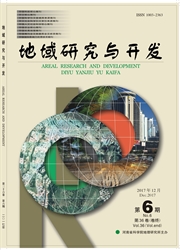

 中文摘要:
中文摘要:
社会-生态系统理论为旅游影响与旅游可持续发展研究提供了新的分析思路,已成为国际上旅游研究的重要理论工具。从社会-生态系统适应性出发,借鉴脆弱性研究中的适应性理论,构建农户旅游发展适应性分析框架,以陕西秦岭金丝峡景区为案例,通过实地调查和访谈获取数据,较系统地研究了农户适应旅游发展的行为模式、影响因素及机制。主要结论包括:①旅游业推动小河流域农业商品化,但并未促进农业增长,相反农业生产功能大幅衰退;农户以旅游经营和常年务工作为主要对策,形成了旅游专营型、主导型、均衡兼营型及务工主导型四种适应效果差异显著的适应模式。②农户适应旅游发展的影响因素包括认知因素(机会和政策认知)、劳动力(劳动力总量、聘用人数)、地理区位(可达性与区位优势度)、自然资本(耕地面积)、物质资产(房屋类型)和社会资本(邻里关系)。③旅游开发导致的自然生计资源缺失与农户生存理性之间的矛盾是适应发生的根源,社区补偿制度是重要推动力量;农户社会理性与经济理性偏好决定着其适应模式选择;适应效果受适应力驱动因素影响。最后对旅游影响的社会-生态整合研究有效性进行讨论,并提出后续深化研究的方向和本研究的实践启示。
 英文摘要:
英文摘要:
The social-ecological system, as a theoretical-framework, provides an original approach to study of tourism impacts, tourism and rural sustainability. It has been a hot topic in the tourism and rural research for its integrated and dynamic perspective linking social and ecological elements. This paper takes the tourist destination and farmer household in rural areas as a complex social-ecological system, and explores a social-ecological adaptive framework for tourism impacts analysis based on understanding adaptability in the framework of social-ecological resilience and vulnerability. The adaptability here refers to the farmer households' behaviour and ability to adjust livelihood against the tourism impacts. Then, we take the villages near Jinsixia in Qinling Mountains as an example to explore the households' adaptability through analyzing the conditions, determinants and mechanism. The data employed in this paper was collected by household investigation and authoritative interview in August and November, 2011. The results are shown as follows. (1) The agriculture in Jinsixia has declined a lot in the last decade, and the tourism accelerated the marketization of agriculture, but has not improved the agricultural growth. The farmers choose to participate in tourism and migration for jobbing throughout the year as main adapting measures, and hire themselves out in the locality or migrate for jobbing during low season for tourism as auxiliary measures. Based on the differences in adaptive measures, the households can be divided into 4 groups, which are households depending on tourism, majored in tourism, depending on both tourism and migrating for job, and majored in migrating job. (2) The key factors driving adaptability include psychological factors, labor, social capital, location factors, natural and material resources. The indicators driving households' adaptability through the purpose of systematic regimes include farmers' perceptibility of development opportunities from tourism, householder
 同期刊论文项目
同期刊论文项目
 同项目期刊论文
同项目期刊论文
 期刊信息
期刊信息
